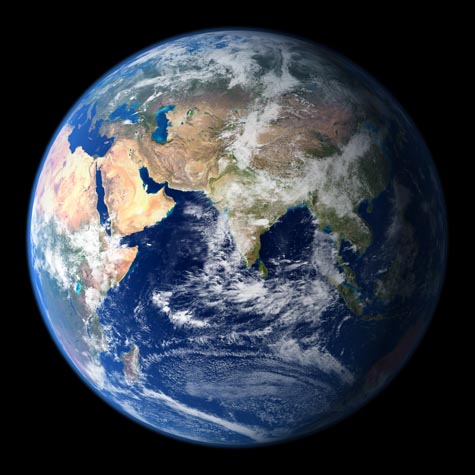
Eastern Hemisphere
Sensor: Terra - MODIS
Data Date: February 8, 2002
Image Credit: NASA Goddard Space Flight Center Image by Reto Stöckli (land surface, shallow water, clouds).
Enhancements: Robert Simmon (ocean color, compositing, 3D globes, animation).
Data and technical support: MODIS Land Group; MODIS Science Data Support Team; MODIS Atmosphere Group; MODIS Ocean Group
Additional data: USGS EROS Data Center (topography); USGS Terrestrial Remote Sensing Flagstaff Field Center (Antarctica); Defense Meteorological Satellite Program (city lights).
ABOUT THIS IMAGE:
This spectacular "blue marble" image is the most detailed true-color image of the entire Earth to date. Using a collection of satellite-based observations, scientists and visualizers stitched together months of observations of the land surface, oceans, sea ice, and clouds into a seamless, true-color mosaic of every square kilometer (.386 square mile) of our planet. These images are freely available to educators, scientists, museums, and the public.
Much
of the information contained in this image came from a single remote-sensing
device-NASA's Moderate Resolution Imaging Spectroradiometer, or MODIS.
Flying over 700 km above the Earth onboard the Terra satellite, MODIS
provides an integrated tool for observing a variety of terrestrial, oceanic,
and atmospheric features of the Earth. The land and coastal ocean portions
of these images are based on surface observations collected from June
through September 2001 and combined, or composited, every eight days to
compensate for clouds that might block the sensor's view of the surface
on any single day. Two different types of ocean data were used in these
images: shallow water true color data, and global ocean color (or chlorophyll)
data. Topographic shading is based on the GTOPO 30 elevation dataset compiled
by the U.S. Geological Survey's EROS Data Center. MODIS observations of
polar sea ice were combined with observations of Antarctica made by the
National Oceanic and Atmospheric Administration's AVHRR sensor-the Advanced
Very High Resolution Radiometer. The cloud image is a composite of two
days of imagery collected in visible light wavelengths and a third day
of thermal infra-red imagery over the poles. Global city lights, derived
from 9 months of observations from the Defense Meteorological Satellite
Program, are superimposed on a darkened land surface map.